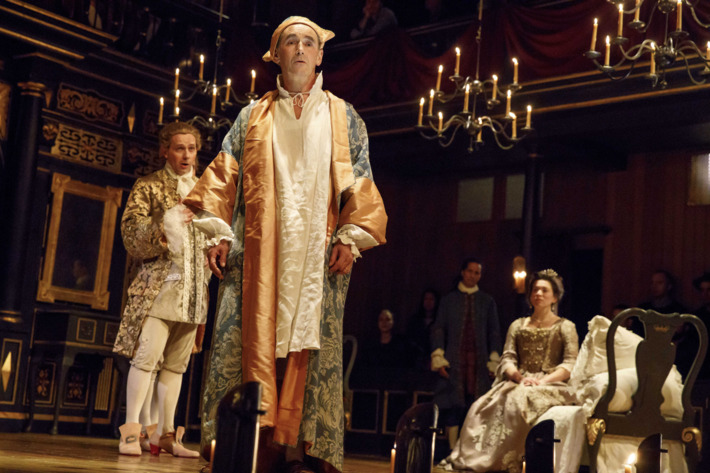

The King is having a bad day; he can’t catch a goldfish in a glass bowl. King Philippe V of Spain has a “brain inflammation” and appears to be going mad. In Farinelli and The King, the new drama at the Belasco Theatre, the superb Mark Rylance portrays the king who ruled from 1683-1746.
The king’s advisor, Don De La Cuadra, wants him to abdicate or have his doctor confirm that he is no longer capable of ruling the country. In the meantime, his second wife, Queen Isabella, searches for some help. On a trip to England, she hears the famous singer, Farinelli, and is so entranced that she brings him back to Spain with her. Upon hearing his voice, The King who is going through extended periods of coma-like sleep, immediately awakens. Farinelli’s voice appears to revive him.
Does music have healing properties? Can the sound of an extraordinary voice do what medicine and physicians can’t? King Philippe probably suffered from what is now termed bipolar disorder, and he was often debilitated by depression. Despite his erratic behavior, he ruled for nearly 50 years. Playwright Claire van Kampen, fascinated by the story of a king who stayed in bed, played with his clocks and sometimes lay in his own excrement, took some liberties with history. However, Farinelli, born Carlo Broschi, really did sing for the king, and after he joined the court, never sang in public again.
The show is well directed by John Dove and designed by Jonathan Fensom. The staging is atmospheric yet simple with the orchestra and part of the audience sharing the stage with the performers. Candle-lit chandeliers suggest the mood and time period.
Rylance mutters and babbles gently and then goes in for a jab like a verbal fencer. He is reminiscent of Shakespearean characters like King Lear or The Fool, often interspersing true insights within his madness. Rylance creates humor with a wig or hat and then startles the audience with sudden violence. He’s like theatrical quicksilver and, as usual, is fascinating to watch.
Although Rylance is worth the price of admission alone, Farinelli is the focal character and as the play progresses, the singer’s role becomes more apparent. The show uses two performers, Sam Crane and Iestyn Davies, to play the character. Having been castrated by his brother when he was only 10, Farinelli is like the gift the Queen gave him; he’s a wind-up bird in a cage. Iestyn Davies sings the Handel arias but never speaks, and when actor Sam Crane talks about his character, it is in third person. The two are identically dressed and when Davies sings, Crane stands near the actor; often he looks pained or in distress and often he appears awkward. Farinelli feels disconnected from his singer-persona and having two people emphasizes the separation. Davies’ counter-tenor voice is incredible; his singing is haunting and it transports the audience.
Despite his madness, King Phillipe is often funny and erratic. Having suffered trauma, Farinelli begins to heal himself seeing the effect that he has on the king. Can music heal? Yes, the singer as well as the listener.